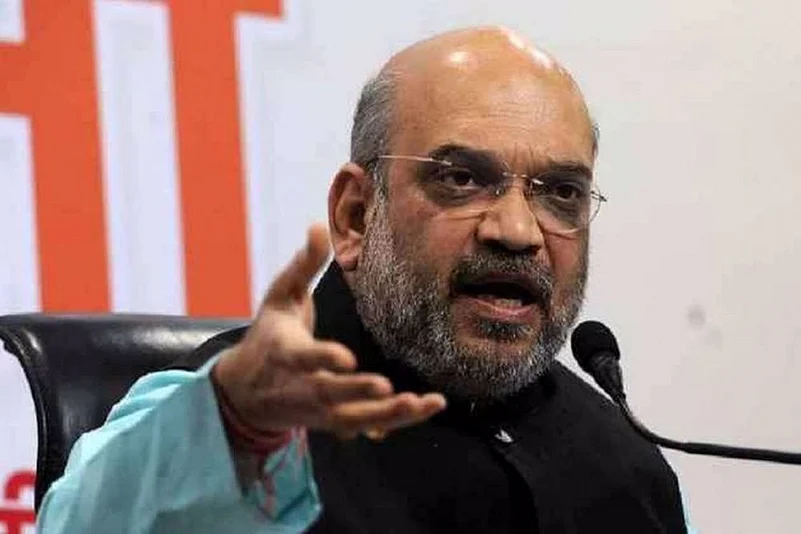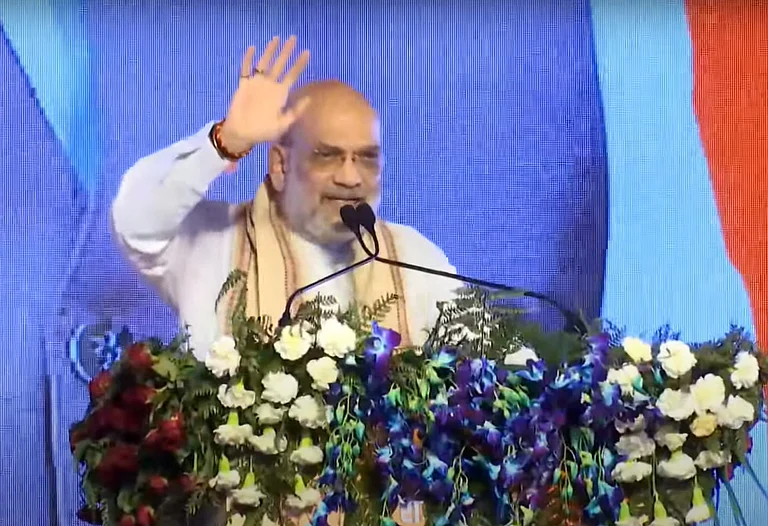Terming Naxals the biggest human rights violators, Union Home Minister Amit Shah on Monday stated that security forces have been carrying out "offensive operations" rather than defensive ones against the insurgents, achieving significant successes in recent times.
Addressing chief ministers and top officials of Naxal-affected states, Shah also mentioned that all Left Wing Extremism (LWE)-affected states are committed to completely eliminating Naxalism by March 2026.
Due to the improved security situation, a high voter turnout of up to 70 percent was witnessed in the Maoist-hit region during the last Lok Sabha polls, where previously there had been zero polling, he said.
Shah noted that more than 13,000 individuals from the northeast, Kashmir, and LWE-affected areas have renounced violence and joined the mainstream. He urged youths involved in the Maoist movement to give up arms and reintegrate into society, stating that all states have prepared beneficial rehabilitation schemes for them.
The crucial meeting, which discussed anti-Naxal operations and development initiatives carried out in the affected areas, took place days after security forces killed 31 ultras in the forests of Chhattisgarh in one of the most successful operations in recent times.
"Security forces are now conducting offensive operations instead of the defensive operations of the past," Shah said.
An "offensive strategy" has been adopted by activating the National Investigation Agency (NIA) to choke the financing of Naxalites, resulting in a shortage of financial resources for them, he added.
Multiple long-duration operations were conducted to ensure that the Naxalites are surrounded, leaving them with no opportunity to escape.
To completely eradicate Naxalism, Shah emphasized that it is essential to give a final push to eliminate this menace once and for all and urged the chief ministers of all affected states to review the progress of development and anti-Naxal operations at least once a month.
Shah also requested the Directors General of Police to conduct such reviews at least once every 15 days.
Describing Naxals as the biggest hurdle to development, he stated they are the largest human rights violators, depriving over eight crore people, especially tribals, of development and basic welfare opportunities. He asserted that Naxalism prevents education, healthcare, connectivity, banking, and postal services from reaching villages.
The home minister emphasized that to ensure that development reaches the last person in society, Naxalism must be completely eliminated.
The Naxal-affected states include Chhattisgarh, Odisha, Telangana, Maharashtra, Jharkhand, Bihar, Andhra Pradesh, and Madhya Pradesh.
Chief ministers of Chhattisgarh, Odisha, Telangana, and Maharashtra attended the meeting, while other states were represented by senior ministers and officials.
Shah stated that with a zero-tolerance approach toward left-wing extremism and the 100 percent implementation of government schemes, the Centre aims to fully develop all Maoist-hit areas.
He explained that the government had established two rules of law to combat the Naxals: first, to establish the rule of law in violence-hit areas, and second, to quickly compensate for losses in areas deprived of development due to the long Naxalite movement.
The home minister noted that for the first time in 30 years, casualties due to LWE were below 100 in 2022, which is a significant achievement.
He asserted that the fight against the Naxals is in its final phase, and by March 2026, with everyone's cooperation, the country will be completely free from this decades-old menace.
Shah reported that 16,463 incidents of violence occurred between 2004 and 2014. The number decreased to 7,700—a reduction of about 53 percent—in the last decade. Similarly, civilian and security force deaths have declined by 70 percent, and the number of districts reporting violence has dropped to 16 from 96, he said.
The number of police stations reporting violence has also fallen to 171 from 465. Of these, 50 police stations are new, and this success is the result of joint efforts by all states and the central government, he added.
Complimenting the Chhattisgarh government for its success in the fight against Naxals in recent months, Shah said the state serves as an inspiration for everyone. The Chhattisgarh government has launched a new campaign for development in all districts affected by LWE.
According to the minister, 237 Naxalites have been killed, 812 arrested, and 723 have surrendered in Chhattisgarh since January 2024.
Shah noted that since 2019, the Modi government has implemented a multi-pronged strategy, under which security vacuums were identified for the deployment of forces. As a result, more than 194 camps were established in just one year, leading to significant success.
He stated that filling security vacuums through 45 police stations, strengthening state intelligence branches, and the excellent performance of state special forces contributed to this success.
He added that the provision of helicopters has drastically reduced the number of casualties among the troops. Earlier, only two helicopters were deployed for the forces' service, but now 12 helicopters—six each from the BSF and the Air Force—are operational.

























